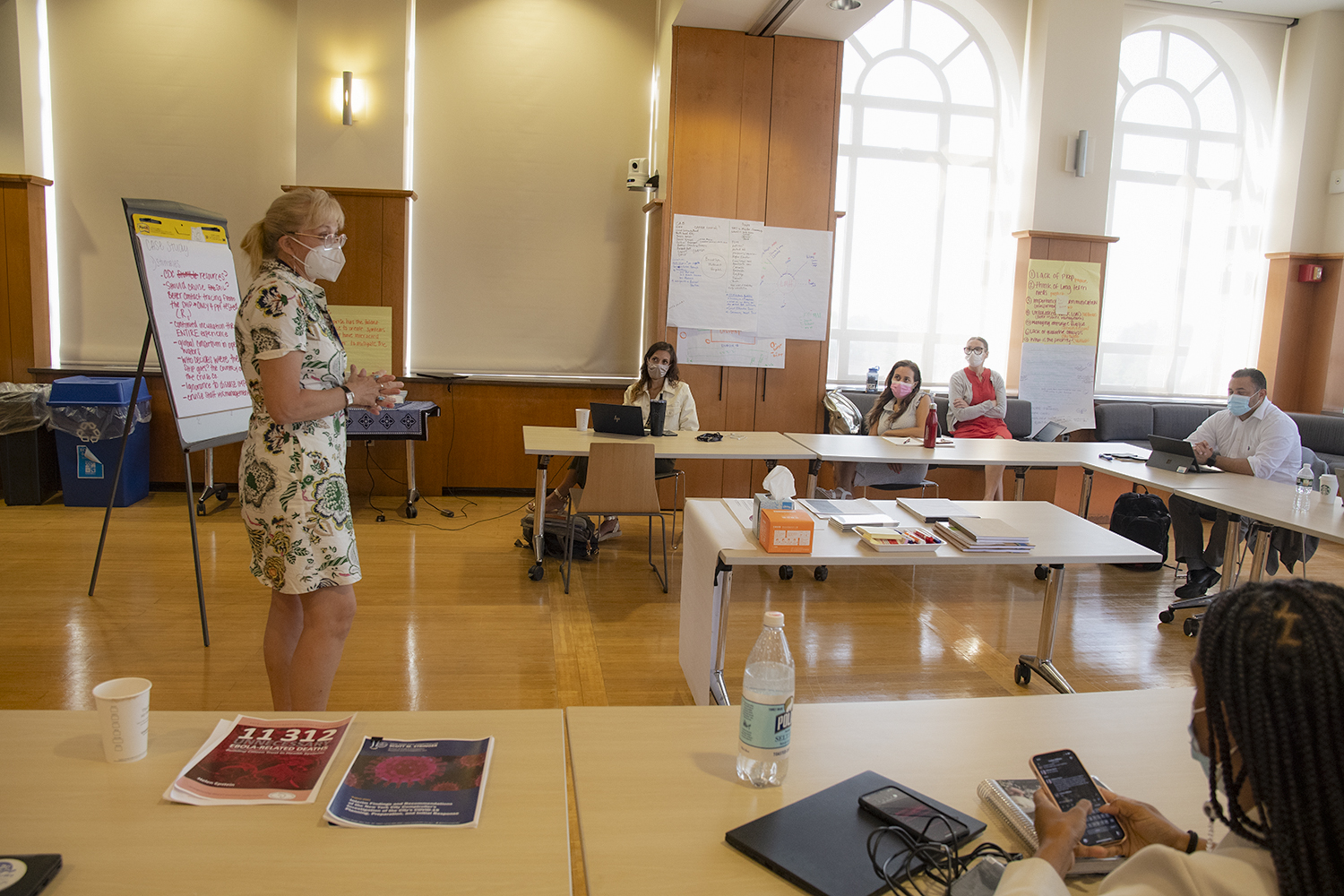In 2021, in collaboration with the Dalio Center for Health Justice at NewYork-Presbyterian, ICAP at Columbia University launched the Responding to Epidemics and Crises in Health (REACH) fellowship. This one-year program provides NewYork-Presbyterian staff working in a variety of roles an opportunity to learn how to predict, manage, and lead robust responses to complex health crises, including emerging infectious diseases.
The first REACH cohort graduated on April 5 after presenting their capstone projects to NewYork-Presbyterian senior vice presidents, introducing new strategies that could be utilized to adapt current or future roles in health care for clinical and non-clinical staff redeployment during a crisis.
Fellowships involved mentorship from industry experts, who presented on topics ranging from U.S. health policy to developing strategies for quality improvement. Fellows’ capstones focused on the implications of redeployment – or reassignment of a health care worker to a new role or work location – as it pertains to staffing roles and responsibilities, maintaining quality, and ensuring community members have a critical voice at the table during pandemic response. All six fellows were selected from across the 10 hospitals within the NewYork-Presbyterian enterprise.
Take, for example, Whitney C. Harris, MSN, RN, ACCNS-P, CPNP-PC, manager of Clinical and Community Strategy at Dalio Center for Health Justice. Harris analyzed the hospital’s redeployment strategy with the goal of optimizing health care worker roles and responsibilities.
“Over the past year, my experience from the REACH fellowship has given me the opportunity to gain a global sense of public health needs and how we can lend better aid to communities,” said Harris. “The COVID-19 pandemic came with many instances of grave news, but the training and education I have received through the REACH fellowship helped me and my colleagues understand how it is possible to triumph through a crisis if we take a moment to listen to each other.”
Robert A. Glaser, MS, Corporate Supply Chain director for NewYork-Presbyterian Hospital, looked at how to better support non-clinical operations in times of a health care crisis. Glaser’s capstone project reviewed past processes of redeployment and whether these processes could be made more equitable.
Other projects were completed by Linda S. Golding, MA, BCC, coordinator of Pastoral Care and Education at New York-Presbyterian Hospital/Columbia University Irving Medical Center, who developed an interdisciplinary readiness plan for spiritual and emotional support for hospital staff during crises, and Loren Avellino, BA, manager of Community Affairs at NewYork-Presbyterian Hospital, who focused on leveraging partnerships with community-based organizations and community experts in hospital crisis response.
“The message was overwhelmingly clear that if redeployment or new strategies to address crises are going to be successful, there needs a great deal of attention paid to systems, training, and developing a culture of respect,” said Emme Deland, MBA, senior vice president, Strategy, and strategic advisor to the Dalio Center for Health Justice. “It does not require an overwhelming amount of dollars as much as it requires attention to individuals’ capabilities and needs.”
In addition to receiving expert mentorship, REACH fellows engaged in week-long skills institutes, skills-building seminars, and a summer debate around vaccine rollout and equity. With the end goal of hospital departments or later cohorts continuing to support fellow projects beyond the capstone level, REACH fellowship alumni will continue to be engaged in the program as potential mentors to incoming fellows.
Susan Michaels-Strasser, PhD, MPH, RN, FAAN, ICAP senior director of Human Resources for Health and director of the REACH program, explained, “While COVID-19 was the impetus for the REACH fellowship, this program will continue beyond the current crisis to build leaders and systems that enable us to be better prepared and nimbler to respond to any crisis we may face in the future.”
The second cohort, which is currently being recruited, will begin July 2023.
About ICAP
A major global health organization that has been improving public health in countries around the world for nearly two decades, ICAP works to transform the health of populations through innovation, science, and global collaboration. Based at Columbia Mailman School of Public Health, ICAP has projects in more than 30 countries, working side-by-side with ministries of health and local governmental, non-governmental, academic, and community partners to confront some of the world’s greatest health challenges. Through evidence-informed programs, meaningful research, tailored technical assistance, effective training and education programs, and rigorous surveillance to measure and evaluate the impact of public health interventions, ICAP aims to realize a global vision of healthy people, empowered communities, and thriving societies. Online at icap.columbia.edu








